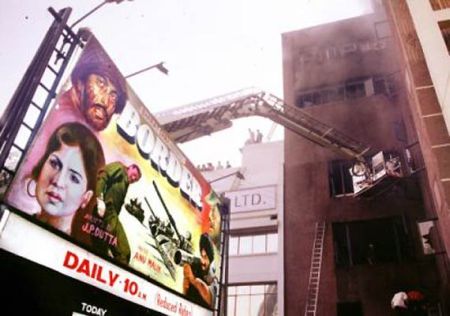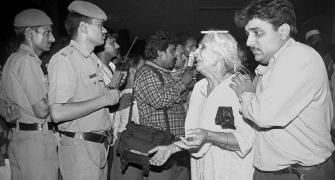 The Supreme Court on Thursday directed real estate baron Gopal Ansal to serve a year’s jail term while his elder brother Sushil Ansal got relief from incarceration with prison term already undergone by him in the nearly two-decade-old case of Uphaar fire tragedy in which 59 people had died.
The Supreme Court on Thursday directed real estate baron Gopal Ansal to serve a year’s jail term while his elder brother Sushil Ansal got relief from incarceration with prison term already undergone by him in the nearly two-decade-old case of Uphaar fire tragedy in which 59 people had died.
The apex court, in a majority 2:1 verdict, asked 67-year-old Gopal Ansal to surrender within four weeks to serve the remaining jail term of one year punishment. He was in jail earlier for around four-and-a-half months.
The majority verdict pronounced by Justices Ranjan Gogoi and Kurian Joseph gave the relief to 76-year-old Sushil Ansal considering his ‘advanced age-related complications’ by giving him prison term already undergone by him, including remission, in the case. He was earlier in jail for around five months.
“In the case of Sushil Ansal, having regard to the advanced age-related complications, as appreciated by the three-judge bench in the order dated September 22, 2015, and having regard to the fact that, of the one year period imposed by the high court, he has already undergone around nine months including remission, his sentence of imprisonment is reduced to the period undergone,” the majority judgement said.
“However, he is also sentenced to a fine of Rs 30 crore. Thus, in the peculiar facts of the case, as appreciated by Gyan Sudha Misra, J. (since retired) and the three-judge bench, we decline the prayer for review of sentence on Sushil Ansal,” it said.
Regarding Gopal Ansal, the majority verdict ‘maintained’ the one-year imprisonment given by the Delhi high court and which was upheld by the two-judge bench of the apex court.
The apex court also upheld the fine of Rs 30 crore each imposed on both the convicts earlier and said it should be utilised for setting up a trauma centre.
The majority verdict was passed by Justices Gogoi and Joseph while Justice Adarsh Kumar Goel gave the minority view.
Writing the minority verdict dismissing the review pleas filed by the Central Bureau of Investigation and the victims' body, Justice Goel said, “It is also necessary to mention that higher fine cannot be read as extra benefit to a rich person but has been imposed on account of capacity to pay. There is neither any illegality nor any impropriety warranting review of said order passed by this court.”
The apex court said that it has ‘partially reviewed’ the verdict, delivered by it on August 19, 2015, sentencing the Ansal brothers to two years rigorous jail term if they fail to pay Rs 30 crore each within three months. The convicts have already paid the fine.
The majority verdict said that the fine of Rs 30 crore each imposed on the convicts by the apex court earlier was ‘not excessive’ and it would be used for setting up a trauma centre.
The order was partially reviewed in case of Gopal Ansal but the majority verdict declined the prayer of the CBI and the victims’ body to review the August 2015 judgement regarding Sushil Ansal.
After the court pronounced its verdict, senior advocate Salman Khurshid, appearing for the Ansal brothers, told the bench that both Sushil and Gopal Ansal were remorseful for what had happened on June 13, 1997.
“We want to express remorse on what had happened. There is a sense of remorse, regret and sense of loss,” Khurshid said, adding, “We hope this would be the end of the matter.”
The majority verdict refused to consider the plea of Gopal Ansal that he be also awarded the jail term already undergone on the ground of parity as done in the case of his elder brother.
“On the principle of parity, the same benefit was extended to Gopal Ansal, but he never had a case of any age-related complications. Therefore, it is not a case to apply the principle of parity. To that extent, the order needs to be reviewed,” it said while asking Gopal Ansal to undergo the remaining jail term.
“Imposition of expiatory fine in addition to incarceration would also serve the penalogical purpose of deterrence having regard also to recidivism. It may also be noted that under section 304 A of the Indian Penal Code, either imprisonment only or with fine or fine alone, is the prescribed punishment.
“Having regard to the wide discretion available to the court under section 304 A, and having regard to the fact that the high court and this court, in appeal, had limited the imprisonment to one year, in our view, the punishment which would serve deterrence and public purpose by both imprisonment and exemplary fine, would be an appropriate punishment in a case like this,” the court said.
Referring to the IPC provision on imposition of fine, the bench said that it does not specify the quantum of fine which can be imposed on a convict and it has to be decided by considering the gravity of the offence.
It said that the fine imposed to the tune of Rs 60 crore is not excessive.
“However, there is no provision under the IPC for substitution of sentence by fine. The only provision is on default sentence under Section 65 of the IPC. Hence, that part also requires correction,” the bench said.
The apex court delivered the judgement on the pleas of CBI and Association of Victims of Uphaar Tragedy seeking a review of the 2015 verdict in the case asking Sushil Ansal and Gopal Ansal to serve a two-year jail term if they fail to pay Rs 30 crore each as fine.
Reacting on the judgement, AVUT convener Neelam Krishnamoorthy, who had lost her two teenage children in the 1997 tragedy, said that the verdict has ‘shaken’ her faith in the judiciary.
Krishnamoorthy, with tears rolling down her cheeks, said, “I am very disappointed with the judgment. It has been 20 years since that tragedy and I hope they had understood the pain and anguish of the people who lost their family members.”
On June 13, 1997, 59 people had died of asphyxia when a fire broke out during the screening of Bollywood movie 'Border' in Uphaar theatre in Green Park area of south Delhi.
Over 100 people were injured in the subsequent stampede.
Earlier, a two-judge bench of the apex court had on March 5, 2014 held Sushil and Gopal Ansal guilty, but differed on the quantum of sentence to be awarded to them after which the matter was heard by a three-judge bench.
The Delhi high court on December 19, 2008 had awarded one-year jail term to both Sushil and Gopal Ansal in the case while reducing the two-year sentence imposed on them by the trial court.









